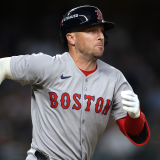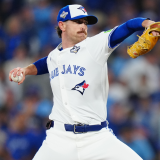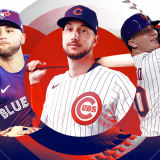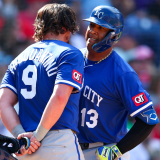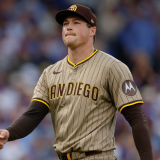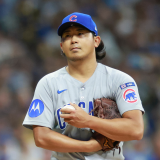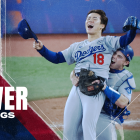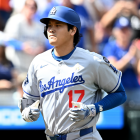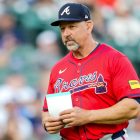MLB qualifying offer: Predicting which players will receive the QO and how the $22 million deal works
Offers must be made within five days of the World Series ending and players have until Nov. 18 to decide
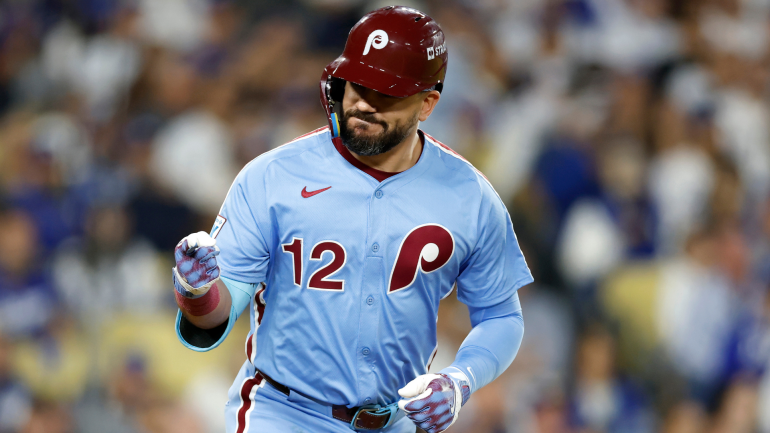
The 2025 World Series is complete and the 2025-26 offseason is already underway. More than 100 players became free agents the day after the World Series ended and soon teams will have to make decisions about contract options and qualifying offers.
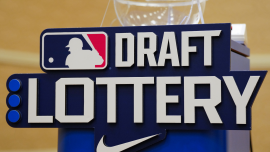
The qualifying offer entitles teams to draft-pick compensation in the event they lose a free agent to another team. The QO is a one-year deal set at the average of the top 125 salaries in baseball; this offseason, it's worth a record $22.025 million, per the Associated Press. That payday is up from $21.05 million last offseason and $20.325 million the offseason before that.
Teams have until five days after the end of the World Series to tender their free agents the QO, and players who receive it then have until 4 p.m. ET on Nov. 18 to accept or reject. Players who accept the QO remain with their team and cannot be traded without their consent until June 15. Players who reject the QO become free agents with draft-pick compensation attached. Simple, right? The process is, but the decisions aren't always.
With that in mind, let's run down this offseason's QO candidates. Here are the draft-pick compensation rules to get us started.
Compensation rules
Once upon a time, teams that lost an eligible free agent received a compensation draft pick after the first round. It was nice and easy. The current rules are a bit more complicated. Here are compensation rules for teams that lose a qualified free agent:
| Former team | Contract size | Compensation 2026 draft pick |
|---|---|---|
Received revenue sharing | Less than $50 million | Pick after competitive balance round B (before third round) |
Received revenue sharing | $50 million or more | Pick after first round |
Paid competitive balance tax | N/A | Pick after fourth round |
All other teams | N/A | Pick after competitive balance round B (before third round) |
The Athletics, Brewers, Diamondbacks, Guardians, Mariners, Marlins, Orioles, Pirates, Rays, Reds, Rockies, Royals, Tigers, and Twins received revenue sharing this season, so the first two scenarios apply to them. The Blue Jays, Dodgers, Mets, Padres, Phillies, Red Sox, and Yankees will pay competitive balance tax (CBT), so they're the third scenario. The Angels, Braves, Cardinals, Cubs, Giants, Nationals, Rangers, and White Sox neither received revenue sharing nor paid CBT. They're in the fourth bucket.
The Astros finished the season right around the $241 million CBT threshold. Cot's Baseball Contracts has the Astros over the threshold with a $244.8 million CBT payroll. FanGraphs puts them below the threshold at $238.2 million. Public estimates are just that: estimates. The actual number won't be known until the league calculates official CBT payrolls. I'm inclined to think the Astros stayed under $241 million, but I don't know that for certain. Their CBT status will affect their QO compensation.
Now here are the penalties for signing a qualified free agent:
| Signing team | 2026 draft pick forfeited | 2027 international bonus money forfeited |
|---|---|---|
Paid CBT | Second- and fifth-highest | $1 million |
Received revenue sharing | Third-highest | none |
All other teams | Second-highest | $500,000 |
The Blue Jays, Dodgers, Mets, Padres, Phillies, Red Sox, Yankees, and possibly the Astros will pay CBT and are in the first group. The Athletics, Brewers, Diamondbacks, Guardians, Mariners, Marlins, Orioles, Pirates, Rays, Reds, Rockies, Royals, Tigers, and Twins received revenue sharing and are in the second group. The Angels, Braves, Cardinals, Cubs, Giants, Nationals, Rangers, White Sox, and possibly the Astros are the third group. Got it? Good.
Thirteen players received the QO last offseason: Nick Martinez accepted the QO; Pete Alonso, Teoscar Hernández, and Sean Manaea signed new contracts to remain with their teams; Willy Adames, Alex Bregman, Corbin Burnes, Max Fried, Nick Pivetta, Anthony Santander, Luis Severino, Juan Soto, and Christian Walker rejected the QO and signed with new teams, giving their former clubs compensatory draft picks. Teams do not gain or lose draft picks for re-signing their own qualified free agent.
Not eligible to receive the QO
Players are eligible for the QO as long as they spent the entire 2025 season with one team and did not receive the QO previously. That means several high-profile free agents are not eligible for the QO this offseason. Here are the notables:
- Changed teams during the season: Merrill Kelly, Josh Naylor, Eugenio Suárez
- Previously received QO: Alonso (opt out), Bregman (opt out), Cody Bellinger (opt out), J.T. Realmuto
The D-backs traded Naylor and Suárez to the Mariners in separate trades that netted them infielder Tyler Locklear, righty Juan Burgos, and three of their top 30 prospects (Brandyn Garcia, Hunter Cranton, Ashton Izzi), per MLB Pipeline. That's a much better haul than the two compensation draft picks Arizona would have received had they kept Naylor and Suárez all year and made them the QO. Anyway, these free agents are among those not eligible for the QO this offseason.
Locks to receive the QO
I count eight stone cold locks to get the QO this offseason: Bo Bichette (Blue Jays), Dylan Cease (Padres), Edwin Díaz (Mets), Zac Gallen (D-backs), Ranger Suárez (Phillies), Kyle Schwarber (Phillies), Kyle Tucker (Cubs), and Framber Valdez (Astros). Díaz opted out of two years and $38 million remaining on his contract to become a free agent. The Mets will tender him the QO. They're able to do so because, when Díaz re-signed with the club three years ago, he re-signed so quickly that the Mets never had a chance to make him the QO. Point is, these eight players will receive the QO and all are almost certain to decline it.
Likely to receive the QO
The only reason Michael King (Padres) is not a QO lock is injuries. He was limited to 15 starts by shoulder and knee trouble this year, and was not part of San Diego's Wild Card Series rotation, something would have been unthinkable coming into 2025. If there are lingering concerns about his health the Padres could opt for a clean break and not risk King accepting the $22.025 million and eating up a big chunk of their available payroll. I expect King to get the QO. The odds he doesn't are not 0% though.
Lucas Giolito (Red Sox) threw the 140 innings he needed to convert his $14 million club option into a $19 million mutual option. He declined his end of the mutual option and became a free agent earlier this week. Giolito suffered an elbow injury late in the season that would have made him unavailable to the Red Sox the entire postseason, but declining the mutual suggests his elbow is sound. Passing on $19 million means we can reasonably assume Giolito will decline the $22.025 million QO. The question is how scared are the Red Sox about the medicals? Their risk tolerance might be lower than we realize.
On the bubble
Perhaps the most fascinating QO case this year is Trent Grisham (Yankees). A defense-first center fielder earlier in his career with the Padres and a seldom-used fourth outfielder with the Yankees in 2024, Grisham broke out with a 34-homer season in 2025. His defense is no longer Gold Glove-caliber, though he can still can man center, and he'll play the entire 2026 season at age 29. On one hand, making Grisham the QO is a no-brainer, especially since the Yankees don't have a center fielder in place for 2026. If Grisham accepts the QO, there are worse outcomes than getting the 34-homer center fielder back on a (pricey) one-year contract.
On the other hand, the Yankees have been very conservative with the QO the last decade or so. They only extended it to their tippy-top free agents (Aaron Judge, Juan Soto, etc.), the players who would never accept it, presumably because they value the payroll flexibility (i.e. the player not unexpectedly accepting the QO) more than the compensation draft pick they would receive after the fourth round given their CBT status. It's a low value pick. From where I sit, making Grisham the QO seems like an easy yes. The last 10 years or so tell us the Yankees play it safe with their QO decisions and may say no.
Josh Hader is the only reliever in the last five years to get the QO. (The Mets would have given one to Díaz three years ago had he not re-signed before the deadline.) The QO is typically reserved for the best of the best relievers, a group Devin Williams (Yankees) belonged to prior to this season. He stumbled enough this year, and the Yankees are conservative enough with the QO, to lead me to believe he won't get it this offseason. I don't think Williams receiving the QO is completely off the table, just very unlikely.
Gleyber Torres (Tigers) is one of those non-elite free agents the Yankees declined to make the QO in recent years. They did not extend the $21.05 million QO to Torres last year, a smart move in hindsight because he ultimately signed a one-year deal worth $15 million with Detroit. Torres will turn only 29 in December and he had a strong year with the Tigers, albeit one right in line with his last few years in New York. The Tigers might have greater risk tolerance than the Yankees and be willing to make him the offer.
Shota Imanaga (Cubs) had a complicated set of option decisions that led to his free agency. The Cubs declined to pick up a three-year, $57 million club option, which triggered a one-year player option worth $15 million. Imanaga declined that and now he's on the market. There's a world where the needle gets threaded and the Cubs are not willing to commit three years and $57 million to him but are willing to roll the dice on the one year and $22.025 million QO. There was some worrisome velocity loss and performance decline this summer for Imanaga though.
Speaking of options, Brandon Woodruff (Brewers) declined his half of a $20 million mutual option, which comes with a $10 million buyout. The $10 million buyout plus the $22.025 million QO means potentially sinking $32.025 million into Woodruff, who ended the season on the injured list, for the small-market Brewers. You could understand their reservations.
The Arraez situation
The perception of Luis Arraez outpaces reality. The three-time batting champion is a free agent this offseason and he's coming off his worst season (.282/.327/.392). He doesn't offer anything other than batting average and good vibes. Arraez doesn't hit for power, doesn't walk, doesn't steal bases, and is a poor defender. I suspect casual fans will be surprised at his next contract, which might be a one-year deal. Arraez is simply not that valuable of a player and won't get a QO. Fun player. Occasionally a great player. But not someone who will cash in this winter and definitely not a player who will get the $22.025M QO.
The official, sure-to-be-wrong CBS Sports prediction is 10 free agents get the QO this offseason: Bichette, Cease, Díaz, Gallen, Giolito, King, (Ranger) Suárez, Schwarber, Tucker, and Valdez. I'm a no on Grisham, Imanaga, Torres, and Woodruff right now. There were 13 QOs last year. I expect to see fewer this year, potentially a lot fewer.


